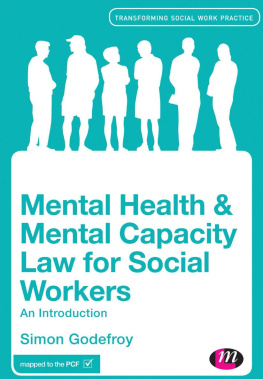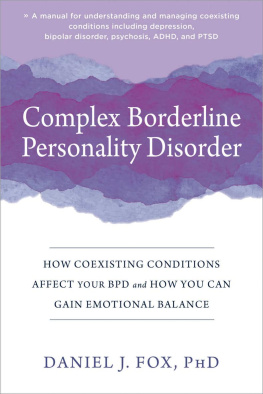Other books you may be interested in:
Anti-racism in Social Work Practice
Edited by Angie Bartoli
ISBN 978-1-909330-13-9
Mental Health and the Criminal Justice System
By Ian Cummins
ISBN 978-1-910391-90-7
Modern Mental Health: Critical Perspectives on Psychiatric Practice
Edited by Steven Walker
ISBN 978-1-909330-53-5
Observing Children and Families: Beyond the Surface
By Gill Butler
ISBN 978-1-910391-62-4
Psychosocial and Relationship-Based Practice
By Claudia Megele
ISBN 978-1-909682-97-9
Social Media and Social Work Education
Edited by Joanne Westwood
ISBN 978-1-909682-57-3
Understanding Substance Use: Policy and Practice
By Elaine Arnull
ISBN 978-1-909330-93-1
Whats Your Problem? Making Sense of Social Policy and the Policy Process
By Stuart Connor
ISBN 978-1-909330-49-8
Titles are also available in a range of electronic formats. To order please go to our website
First published in 2017 by Critical Publishing Ltd
All rights reserved. No part of this publication may be reproduced, stored in a retrieval system, or transmitted in any form or by any means, electronic, mechanical, photocopying, recording or otherwise, without prior permission in writing from the publisher.
Copyright 2017 Julia Warrener
British Library Cataloguing in Publication Data
A CIP record for this book is available from the British Library
ISBN: 978-1-909330-81-8
This book is also available in the following e-book formats:
MOBI ISBN: 978-1-909330-82-5
EPUB ISBN: 978-1-909330-83-2
Adobe e-book ISBN: 978-1-909330-84-9
The rights of Julia Warrener be identified as the Author of this work have been asserted by her in accordance with the Copyright, Design and Patents Act 1988.
Cover and text design by Greensplash Limited
Project Management by Out of House Publishing
Print managed and manufactured by Jellyfish Solutions
Critical Publishing
3 Connaught Road
St Albans AL3 5RX
www.criticalpublishing.com
Paper from responsible sources
Foreword
This timely book focuses on the best way to understand and support people with personality disorder, who constitute the second largest category of people experiencing mental ill health in the UK and elsewhere.
Unlike most books in the field of mental health, it is aimed at social workers, service users and family members, as well as policy makers and researchers. Uniquely, this text is based on findings from the perspectives of both social workers and service users on personality disorder.
The book benefits from the authors long experience as a mental health social worker in a forensic setting, her PhD original research, as well as her experience as a social work and social policy educator.
It begins by highlighting the complex nature of personality disorder, the unsatisfactory diagnostic system attached to it, its multi-dimensional character, and the multidisciplinary divide. The external stigma attached to the label focused around the assumed danger to others by the person experiencing personality disorder, often ignoring the much higher potential risk to self, is recognised, as well as the impact of the internalised stigma in which the person perceives of her/himself as a failure, rejected by others, while wanting affirmation and acceptance. The high frequency of early traumatic experiences noted in the research on PD and in the life stories of service users to whom the diagnosis is attributed, which thus far has not been accepted as a key issue in the DSM diagnostic system, is singled out as an example of what needs to be taken into account not only in the diagnostic system but also in working with this group. By now we recognise that it is possible to experience post-traumatic growth, provided the right support is given to the person and their family.
All of the above leads the author to the adoption of the social perspective as the choice perspective, because it offers a more comprehensive approach, one that does not see the individual as a unit apart from their family or community, recognising our interdependency on each other. This social perspective relies on social work values and includes also the lessons from the new meaning of mental health recovery and interventions related to it, which are based on the strengths approach.
The authors original research investigating the views of both social workers and service users on what each wants from the other in the context of personality disorder is anchored in constructivist grounded theory and participatory research, a welcome departure from the usual positivist, questionnaire-led, research. The main findings illuminate the centrality of building a trusting, respectful, person-centred, relationship between service users and social workers as the base for their shared work which needs to include transparency and consistency, feedback, modelling, support for social and family networking and practical support. While not ignoring the need to avoid negative risks, the value of taking calculated positive risk is called for, alongside a trauma-informed relationship-based approach.
Thus the book provides readers with an alternative to the NPM (New Public Management) approach, one that can promote the wellbeing of both service users and social workers, and comes with evidence of how it enables safety and positive growth for people with personality disorder within the framework of social work values.
Written in an easily readable style, each chapter begins with critical questions, ending with a summary and followed by suggestions for further reading.
This book is highly commendable for social work practitioners, students at all levels, service users, managers, policy makers and researchers.
Prof. Shulamit Ramon
School of Health and Social Work, University of Hertfordshire
Professor Ramon is a qualified social worker and a chartered clinical psychologist, who has researched extensively mental health issues with service users as co-researchers. Her recent research projects and publications include: Women and Providers: Domestic Violence and Mental Health












 Julia Warrener
Julia Warrener